イベント&アクティビティ
DIJ researchers in Belgian and German media on Tokyo Olympics
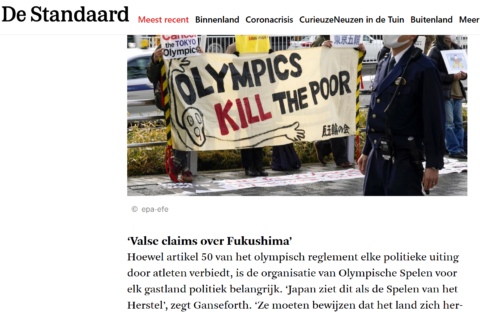
DIJ human geographer Sonja Ganseforth and historian Torsten Weber are quoted in newspaper articles in the Belgian daily De Standaard and the German weekly Die Zeit. Sonja comments on recent criticism in Japan of the Tokyo Olympics. “Activists have been criticizing the exorbitant spending and corruption in the run-up to the Games for years”, she is quoted in the article “Japanners vrezen dat Spelen zullen fungeren als superverspreider” (Japanese fear that Games may act as superspreader). “The expensive postponement due to the Covid crisis also leads to skepticism”, Sonja says. Torsten’s comments on how the Tokyo Olympics have become linked to promoting nationalism in Japan are quoted in “Olympia 2021 in Japan: Japans Nationalisten und ihr Plan mit den Spielen” (Japan’s nationalists and their plan with the Games). Their research on the impact of the 2020 Olympics on Japanese society is part of the DIJ’s special project on the Tokyo Olympics and the open access book publication Japan Through the Lens of the Tokyo Olympics.
Online cooperation meeting with University of Vienna
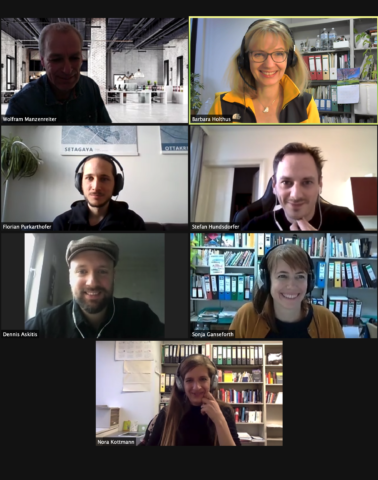
On February 4, seven researchers from the DIJ and its cooperation partner at the University of Vienna met online. Due to the pandemic, Vienna doctoral students are forced to modify their Japan research: travel to Japan has not been possible for over a year, and the doctoral students turn to hiring a Japanese company to conduct survey research on their behalf. DIJ deputy director Barbara Holthus and DIJ researchers Sonja Ganseforth and Nora Kottmann, who have all conducted their own surveys in Japan provided hands-on advice on research companies, costs involved, possible sampling strategies, questionnaire construction and the importance of sharei (incentives). Former DIJ PhD students Florian Purkarthofer and Dennis Askitis as well as Stefan Hundsdorfer, who are all currently doctoral students at Vienna, attended the meeting. It was part of the tight-knit cooperation between the DIJ and Japanese Studies at the University of Vienna. The cooperation started in 2010 with Wolfram Manzenreiter, who also participated in the online meeting, joining the editorial board of Contemporary Japan. Since 2014, one DIJ researcher per year has been teaching a class in Vienna.
Barbara Holthus im DLF Kultur-Interview zu Tokyo 2020
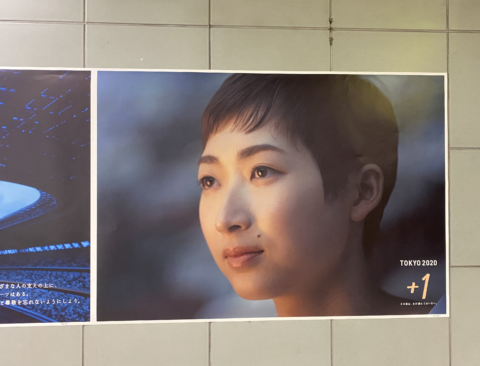
Ein halbes Jahr vor der geplanten Eröffnung der olympischen Spiele hat Soziologin und stellvertretende Direktorin Barbara Holthus im Interview mit DLF Kultur die geschwundene Olympia-Begeisterung in Japan kommentiert. Die Euphorie von 2013, als Tokyo die Spiele zugesprochen wurden, sei Skepsis und Unverständnis über die ausufernden Kosten gewichen. Meinungsumfragen zufolge befürworteten aktuell rund 80% der Bevölkerung eine Absage oder neuerliche Verschiebung. In der andauernden Pandemie bestünde zudem die Gefahr, dass “Olympia zu einem Super-Spreader-Event würde”, so Holthus. Dennoch wolle “Tokyo unbedingt diese Spiele haben, komme was wolle”. Barbara Holthus ist Mitherausgeberin des Olympia-Buches Japan through the lens of the Tokyo Olympics (Routledge 2020, open access), das Japans Gesellschaft, Politik und Wirtschaft anhand der Vorbereitungen auf Tokyo 2020 untersucht. Das DLF-Interview kann hier nachgehört werden.
Franz Waldenberger in DIE ZEIT on Japan’s economic policy
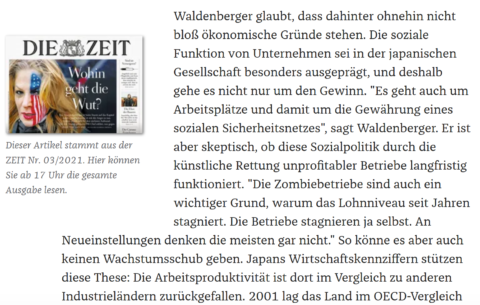
DIJ director and economist Franz Waldenberger commented in the current issue of DIE ZEIT (3/21) on the Japanese government’s strategy of artificially keeping so-called “zombie companies” alive through state-guaranteed loans. “The zero interest rate policy ensures that the selection process between productive and unproductive companies weakens.” At the same time, he explained that these subsidies to unprofitable businesses in Japan fulfilled a social function. “It is also about jobs and thus about providing a social safety net,” Waldenberger stressed. The article “Land of Zombies” (in German) can also be read in the online edition here.
Season’s Greetings and best wishes for the New Year

Das Deutsche Institut für Japanstudien wünscht erholsame und frohe Festtage und einen guten Start in ein erfolgreiches Jahr des Büffels!
The German Institute for Japanese Studies wishes you a happy holiday season and a successful Year of the Ox!
ドイツ日本研究所一同、皆様のご多幸と来るべき新年が成功の年になることを祈念いたします。
Sonja Ganseforth quoted in news reports on anti-Olympic protests

Comments by social scientist Sonja Ganseforth on recent anti-Olympic protests in Tokyo have appeared in international media. “Once the decision to hold the Olympics in Tokyo had been made, many (Japanese) also considered it anti-social or even unpatriotic to protest openly against the Games”, Sonja is quoted in the AP news article Critics speak out on Tokyo Olympic costs, pandemic, fairness published on 13 November. A version of the article also appeared in the Japan Times on 17 November. On 22 November, an interview with Sonja appeared in the German daily newspaper taz. In “Eine Absage ist möglich”, she explains the role of anti-Olympic activism in Japanese society. Sonja has been researching anti-Olympic movements in Japan as part of the DIJ special project on the Tokyo Olympics and its book publication Japan through the lens of the Tokyo Olympics. Her chapter “The difference between zero and one” is available for free download, alongside all other chapters in this open access book.
Sonja Ganseforth’s research at Coastal Transitions conference
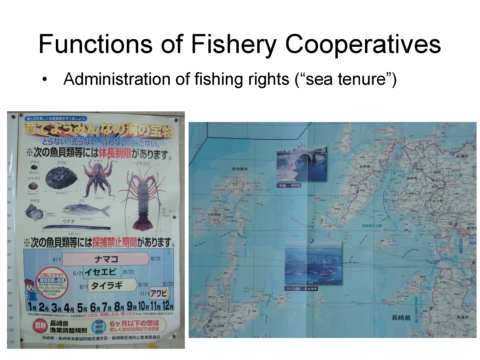 On November 6, human geographer Sonja Ganseforth presented her latest research on the implications of the Japanese Fishery Law reform for small-scale coastal fisheries at the “Coastal Transitions: Blue Economy” 2020 conference. Based on qualitative field research in rural Japan, Sonja’s paper “Blue Growth or Decline in Japanese Coastal Fisheries” analyzed how global discourses of sustainable growth and institutional reform in the Japanese fishing sector are driving the enclosure of one of the last vestiges of natural resource commons. The focus on private capital and presuppositions of economic and scientific rationality drives the commodification and enclosure of this contracting commons – a process supported by domestic political circles as well as through international agenda setting campaigns. Sonja’s presentation is part of her ongoing research project on Fishing communities between growth and demise in Japan. The online conference “Coastal Transitions: Blue Economy” was jointly organized by Liverpool John Moores University, Southern Connecticut State University and MIC University of Limerick.
On November 6, human geographer Sonja Ganseforth presented her latest research on the implications of the Japanese Fishery Law reform for small-scale coastal fisheries at the “Coastal Transitions: Blue Economy” 2020 conference. Based on qualitative field research in rural Japan, Sonja’s paper “Blue Growth or Decline in Japanese Coastal Fisheries” analyzed how global discourses of sustainable growth and institutional reform in the Japanese fishing sector are driving the enclosure of one of the last vestiges of natural resource commons. The focus on private capital and presuppositions of economic and scientific rationality drives the commodification and enclosure of this contracting commons – a process supported by domestic political circles as well as through international agenda setting campaigns. Sonja’s presentation is part of her ongoing research project on Fishing communities between growth and demise in Japan. The online conference “Coastal Transitions: Blue Economy” was jointly organized by Liverpool John Moores University, Southern Connecticut State University and MIC University of Limerick.
新駐独日本大使がDIJを訪問
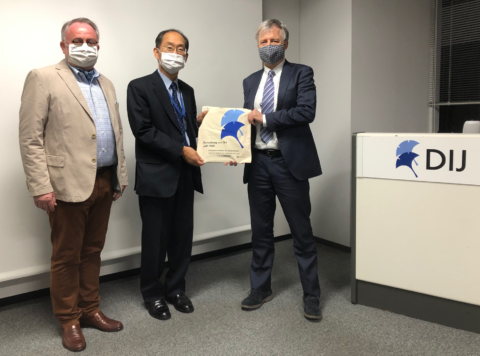
11月4日、この度在ドイツ連邦共和国全権特命大使 として赴任される柳秀直氏が当研究所を訪問されました。所長フランツ・ヴァルデンベルガーと事務局長ヨアヒム・レールは、柳大使にDIJで行われている研究とマックス・ウェーバー財団の国際的なネットワークについて説明しました。流暢なドイツ語で柳大使は、ベルリンでの2度目の赴任を、ドイツの新連邦州 への理解とつながりを深めるためにも非常に楽しみにされていることをお話し下さいました。さらに、パンデミックの影響ですべてが実現できないかもしれないとしても、来年の日独関係160周年記念行事を楽しみにしていると語られました。対談の中で柳大使は、過去30年間の日独関係の発展の中でDIJが果たしてきた重要な役割を称賛して下さいました。
柳大使は2014年から2017年までミュンヘン総領事を、その後約3年間ヨルダン大使を務められました。ベルリンに出発される数日前というお忙しい中、当研究所にお越し下さいましたことを私共は大変嬉しく光栄に思っております。





 Open Access
Open Access
